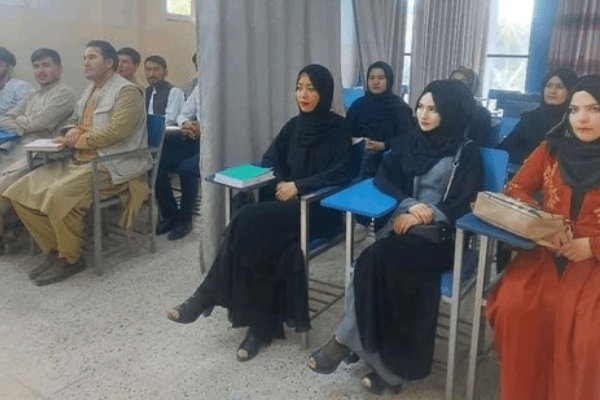Women in Afghanistan will still be allowed to study in universities, however classrooms will be split between the genders and female students will be required to wear head coverings.
Abdul Baqi Haqqani, the country’s Higher Education Minister, announced new policies at a news conference on Sunday, revealing that female university students must wear hijabs to attend the classes: specifically, an abaya robe and niqab which covers most of the face.
“We will not allow boys and girls to study together,” Haqqani said. “We will not allow co-education.”
He explained that female students will be taught by female teachers wherever possible and that the subjects being taught to women would be reviewed.
“Thanks to God we have a high number of women teachers,” he declared. “We will not face any problems in this. All efforts will be made to find and provide women teachers for female students.”
Haqqani also expressed his desire to see the graduates of Afghanistan’s universities competing with other college graduates around the world. The new policy will apply to private colleges and universities.
His latest announcement came just one day after the Taliban raised their flag over the presidential palace, indicating the beginning of their new, all-male government, which was announced last week.
On Monday, local news agencies in Afghanistan reported that university classes had begun in the country with a “curtain of separation”.
Aamaj News posted a photo on Twitter showing male and female students sitting in a classroom separated by a curtain.
Taliban spokesman Syed Zekrullah Hashmi was interviewed on Afghanistan’s TOLO News, where he said women should give birth and raise children, adding that “It’s not necessary that women be in the cabinet,” responding to the all-male government.
Before Taliban’s takeover, universities were co-ed, where men and women were permitted to study side by side, and female students were not confined to a strict dress code.
For current students, the new rules are deeply concerning.
“Putting up curtains is not acceptable,” a 21-year-old student at Kabul University named Anjila told Reuters.
“I really felt terrible when I entered the class … We are gradually going back to 20 years ago.”
Since its takeover of the capital on August 15, the Taliban have claimed that women will be able to access higher education under its laws, saying “thousands” of schools will continue to operate.
However, they have persistently mandated a ban on sports for women, and continued to use violence against female protesters demanding equal rights in recent days.
Image: Twitter/@AamajN


